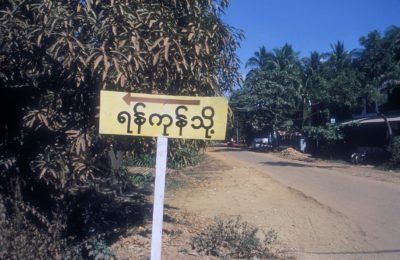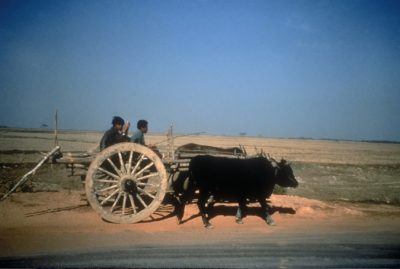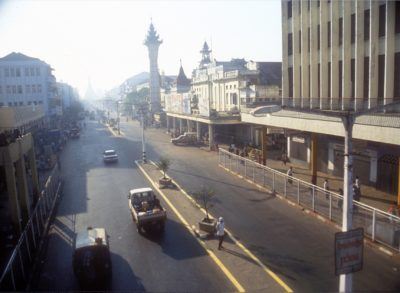by Bill Murray
 Aye Chan Zin, a 22 year old competitive cyclist, once raced from Yangon to Mandalay and back. He fell and lost both incisors to gold teeth.
Aye Chan Zin, a 22 year old competitive cyclist, once raced from Yangon to Mandalay and back. He fell and lost both incisors to gold teeth.
“Road very bad out there,” he grinned, goldly.
Aye Chan was a child of privilege, a third-year vet school student with parents with government jobs. His dad was Chinese, a doctor working on a leprosy project, his mom a philosophy teacher at Yangon University. A family album they kept in the family car was chock full of smiling brothers and sisters.
He had his dad’s tan Toyota with tinted windows. He would be our guide and driver, and on Tuesday the seventh of February or, as The New Light of Myanmar newspaper called it, the eighth waxing of Tabodwe, 1356 ME, we set out from Yangon for a drive into the country.
•••••
They must yearn in Burma just now for the good old days of six months ago when Aung San Suu Kyi’s political fig leaf, the National League for Democracy, stood between the people and the army, called the Tatmadaw. Seven hundred people have since died in street protests.
I’ve been reading this week about Burmese banks running out of money. People “if they are lucky” try to withdraw their savings, but they can’t get all of their own money. Banks “have imposed fees of 8%-9% to withdraw funds.”
Six months ago I had a plan to spend a month in Yangon. We even found a place to stay. Now, not a chance. The time we did visit, when we met Aye Chan, came after the coup that led to Aung San Suu Kyi’s years-long house arrest.
•••••
First on Aye Chan’s tour of Yangon hotspots, “That’s military headquarters.”
Did the leadership live there?
“Not live just work.”
There was the parliament building far across a lawn. It was not possible to visit the parliament building. You can tour the White House, the Kremlin and the Great Hall of the People, but you may not tour the Myanmar parliament. Up next came Myanmar Television and Radio, and then, “ice factory.”
Guides have their peculiarities. Aye Chan was a factory enthusiast. Before the end of the day we saw ice factory, milk factory, brick factory (“you want to take picture?”), rice factory and garment factory.
Beyond Yangon, beyond the airport, the road went full African. Benevolent open spaces countered an atrocity of broken asphalt. People, mostly barefoot, carried baskets on their heads or raised parasols. Up here people really lived outdoors more than in. Houses were mostly thatch, with open rooms. It was the vast Mississippi flood plain with banana trees.
At the World War II allied cemetery, the names of some 27,000 war dead under British crown command in the British Burma and Assam campaigns were inscribed in stone alongside endless well-manicured rows of graves. Names like Wrigley and Hicks, Collins and Stark, and also Singh and Gurung and Pun.
 Local folks worked the road all the way to Bago. Barefoot women carried rocks in wicker baskets on their heads for crushing by big rolling machines. Road work conscripts made 100 kyats (“chots”) a day for six hours of carrying rocks on their heads, a meal included. That was a dollar. I read that up in Mandalay, the public was made to build infrastructure for no pay. Not even a dollar.
Local folks worked the road all the way to Bago. Barefoot women carried rocks in wicker baskets on their heads for crushing by big rolling machines. Road work conscripts made 100 kyats (“chots”) a day for six hours of carrying rocks on their heads, a meal included. That was a dollar. I read that up in Mandalay, the public was made to build infrastructure for no pay. Not even a dollar.
One time we became friends with a young couple on a trip to Albania. This road work made me think of how they remembered life under Enver Hoxha. The Albanian Revolutionary Triangle included physical labor as part of schooling.
In Burma, pagodas sprouted like the concrete military pillboxes Hoxha scattered across the Albanian countryside. And there was not a single military or para-military or renegade-teens-on-the-prowl-for-extorted-cigarettes roadblock. Driving was free and easy.
Out in the middle of rubber farms in the middle of nowhere, suddenly, just before noon, the world exploded before us. The whole earth went splintery and kaleidoscopic with a terrific bang.
Aye Chan kept a lead foot on the gas, the tan Toyota flew down the road, and all three of us were blinded until slowly we realized the windshield had shattered. We couldn’t see a thing in the billowing dust and finally Chan coasted to a halt.
He anguished for a long time. Maybe it was rocks from the construction work, but whatever caused it, there’d be hell to pay for busting his Dad’s windshield. We all pulled big glass chunks out of the windshield frame, cutting our hands a little and scraping the glass off the seats and wiping the sweat off our brows. A bird cawed a curious tune. Two men wandered out to look.
There was no choice but to bounce on the last 25 minutes to Bago. Little by little, shards and chunks fell and flew, with the dust and never-emission-inspected exhaust, straight into our faces.
•••••
From farther back into historical mists than anyone can see, a tangled mass of feuding tribes extended from the Indian Manipur plain to the southeast, here to Bago and on to the Irrawaddy delta. They’re still tangled and feuding today, with more or less formidable militias, often ethnically-based, operating just about all over the country.
(A new militia called the Chinland Defense Force skirmished with the Tatmadaw recently, briefly holding a town called Mindat in a four-day battle last month. Chin State, in the west, had been the last ethnic state in Myanmar without a Tatmadaw-challenging insurgency.)
In the eighteenth century rebellion spread like summer grassfire north from the Kingdom of Bago. A once great fortress at Ava near Mandalay quickly fell, the royal family taken captive. An unlikely unifier, a canny farmer named Aung Zeyya, then 36, drew a line in the pine forests and made a stand.
He defeated wave after wave of Mon fighters from the south. His army and territory grew with his successes and by the time he took the pagoda town of Dagon in May 1755 his followers called him Alaungpaya, “the Future Bhudda.”
The history, and to some lingering extent the present of Myanmar, is a story of these warring tribes, ethnicities and ideologies. Dagon, the “Future Buddha’s” conquest, known to British colonials as Rangoon, is now Yangon.
•••••
In Bago, teak and jasmine trees dropped ivory blossoms before us. There were tablets of stone they said predated Buddhism. Competing Buddhist evangels shouted into microphones soliciting money for improvements, an arcade of religious carnival barkers that threw a slant on Buddhism I’ve never seen before. One little independent fellow farther down the road just solicited in general, under a sort of Burmese revival tent.
The atmosphere at Bago’s pagoda was musty amusement park, a languorous, sleepy one, with gaily colored pavilions ringing the main pagoda like the different countries’ pavilions around a really tiny Epcot Center. All of them were different.
The Great Golden God pagoda, Shwemawdaw, stood deserted, making today a good day for laymen like us to dust up the bottoms of our feet with a few rounds of circumnavigation. An earthquake in 1917 sent this pagoda’s pinnacle tumbling. Not to be outdone by nature, they built a tiny pagoda right on top of the fallen bit and put up a commemorative placard.
The monastery revealed monks as pack rats – icons of Buddhas and pagodas occupied every inch of space. Seemed to me the impact of any one was diminished among others. The more the merrier, I guess.
The holy word had been inscribed on long stacks of leaves – for centuries, I guess. Monks’ austere sleeping rolls and a wood floor comprised the entirety of their accommodations. Kids chiseled new wood adornments for the grounds. A woman sauntered by offering watermelon – by the slice, pre-sliced – from a tray on her head. And chomping on one herself.
Aye Chan decided, yep, his Dad was gonna kill him. His only hope – stay with a friend and work all night to figure out how to fix the windshield. Said he knew a guy with a glass shop.
•••••
Back in Yangon Aye Chan turned down University Avenue. Aung San Suu Kyi lived here. Born in 1945, she was the third child of Aung San and Khin Kyi, a nurse (We’ll talk about Aung San in part two).
At 14, in 1957, Aung San Suu Kyi left Burma with her mother and lived abroad for thirty years. She married a British academic, a Tibet scholar named Michael Aris, and lived in Bhutan and Oxford.
Her National League for Democracy won the 1990 elections. The State Law and Order Restoration Council, the SLORC, admitted the results but wouldn’t hand over power. In the run-up to the election whole Burmese towns were dislocated in an attempt to untrack the NLD steamroller. Still, the NLD won a convincing victory.
Aung San Suu Kyi’s candidacy was a coincidence (bringing to mind another unintentional president, Belarus’s Svetlana Tikhanovskaya, currently exiled to Lithuania). Suu Kyi didn’t mean to be in Myanmar for politics, but only to tend to her mother, who was in hospital after a severe stroke at the time of the 8.8.88 student uprising.
When that rebellion was suppressed, Suu Kyi switched roles from nurse to revolutionary. She won but couldn’t hold office, barred by the SLORC. Now she had a choice: return to London, to her husband and sons, in the certainty she could never come back, or personify the resistance, live alone, surrounded by military at #54 University Avenue, across Inya Lake from the military leader. Which is what she did.
The next summer the SLORC confined her to her house. During her six years of house arrest, “Every Saturday afternoon at four she stood up on a little box and spoke from behind the gates of her house, and hundreds of people came to listen….”
Aye Chan pointed out there was no military outside. “Inside the gate,” he said.
•••••
 Just before sunset I crossed Strand Road to the ferry dock, tried to determine what vessel went where, and finally just picked one and climbed aboard. Darkness crept up.
Just before sunset I crossed Strand Road to the ferry dock, tried to determine what vessel went where, and finally just picked one and climbed aboard. Darkness crept up.
People stared, benevolently. The “Autobus 1” had three bare bulbs strung overhead and a pile of eight-inch tall wooden seats that you grabbed and sat down low on, which I did. Pretty soon I was surrounded by boys, say seventeen, fifteen and eight years old. We hadn’t a common language. They just wanted to hang out with the foreigner. So we sat and smoked. What the hell.
Maybe 150 of us plowed through the water hyacinths for an eight-minute trip to the village across the way, and maybe 40 people came back. On the far side I saw that my new friend the eight year old was no passenger. He might have been working this thing all day, gathering the stools in a big pile for retrieval by the next batch of passengers.
One of my other new friends hopped off the ferry and strode toward a man with an ice chest by the light of two candles on the dock, who sold him a drink. Directly across the river, line of sight from the heart of Myanmar’s capital city, no electricity. Just candles.
•••••
Aye Chan was back the next day and brought his friend Kyaw Win Maung. I rushed outside and around the corner and found that he had done it! Between dusk and this morning Aye Chan had got a brand new Toyota windshield installed. In Myanmar!
He didn’t understand high-fives, but backslapping was good enough.
“How did you do it?”
“My friend has a glass shop,” He said, swelled with pride. “We finished last night nine o’clock.”
This was the greatest news. His dad wouldn’t kill him.
The plan today was to get out on the Irrawaddy, and while Aye Chann headed for the lower Pazundaung jetty, we got to know his friend (call him “Chaw”).
Kyaw finished school in ’77 as a geologist but had always been a tour guide. Clear-eyed and soft-spoken with an open face, Kyaw was easy to like, and it didn’t take much prodding to hear his whole story.
When he started his tour guide job they posted him to Pagan, optimistically eight hours drive to the northwest and full of ancient pagodas.
He met and married a country girl, built a house himself, and settled back, he thought, to live out his life there. The sunsets were beautiful. They had a daughter.
Then a man he’d met in his tour guide job invited him to visit the U.S. After saving enough to care for his family in his absence, off he went. For six months he stayed in the U.S. He saw his first snow in Carlisle, Pennsylvania.
One day in 1988 he heard on Christian Science Monitor radio that his entire village had to move. The military government was trying to disrupt the elections the National League for Democracy won.
A week later he got a letter from his wife saying she had a week to tear down the house he’d built and move, along with everybody else in town, ten kilometers away.
He went back to Myanmar, gathered his wife and baby and moved in with his father in Yangon. His brother died at 32 leaving two nieces for Kyaw to care for, along with his wife, daughter and now, his elderly dad too.
His wife was a simple country girl. She had a small business selling candy to kids, cheroots, that kind of thing, when they met in Pagan and he didn’t know how she’d do in the big city. So although he hoped to visit the U.S. again and had a standing invitation, it would be some time before he got his nieces off to college and saved enough (at $15 a day) to provide for his dad, wife and child in his absence.
END PART ONE
